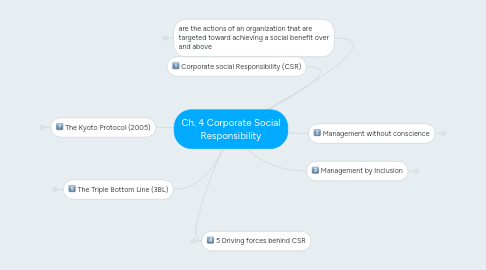
1. are the actions of an organization that are targeted toward achieving a social benefit over and above
1.1. Maximizing profits for shareholders
1.2. Meeting all legal obligations
2. Corporate social Responsibility (CSR)
3. 5 Driving forces behind CSR
3.1. Transparency
3.1.1. more difficult to hide things
3.2. Knowledge
3.2.1. consumers & investors have more information available
3.3. Sustainability
3.3.1. pressure for companies to demonstrate they are environmentally sound and planning for the long-run
3.4. Globalization
3.4.1. this is a new stage of capitalist development, this time without public institutions to protect society
3.5. Failure of the Public Sector
3.5.1. now many developed countries including the US citizens expect less from government than in the past.
4. The Triple Bottom Line (3BL)
4.1. involves documenting corporate performance by adding social & environmental goals in addition to financial goals.
4.1.1. Environmental & social goals do not have standards yet
4.1.2. Financial goals use GAAP standards
4.1.3. 3 Types of CSR
4.1.3.1. Ethical
4.1.3.1.1. purest, most legitimate type of CSR
4.1.3.1.2. Here organizations pursue clearly defined sense of social conscience in corporate management
4.1.3.2. Altruistic
4.1.3.2.1. philanthropic approach to CSR
4.1.3.2.2. Involves things like giving back to the local community or to designated national or international programs
4.1.3.3. Strategic
4.1.3.3.1. approach where organizations target programs that will generate the most positive publicity or goodwill.
4.1.3.3.2. Runs greatest risk of being perceived as self-serving
5. The Kyoto Protocol (2005)
5.1. agreement between 160 countries that required developed nations to reduce their greenhouse gas emissions.
5.2. 2 ways to implement:
5.2.1. modifying their own domestic industries
5.2.2. funding projects in developing nations in return for “carbon credits”
5.3. The United States has not signed yet!
6. Management without conscience
6.1. 2 approaches:
6.1.1. Many use an instrumental approach to CSR which says the only obligation of a corporation is to maximize profits while providing goods/services to meet customer needs.
6.1.2. The social contract approach to CSR is the perspective that corporations have an obligation to society over & above expectations of its shareholders.
7. Management by Inclusion
7.1. Doing well by doing good. This involves doing things like:
7.1.1. Charitable donations
7.1.2. Sponsoring local events
7.1.3. Environmental awareness; recycling, earth friendly packaging
